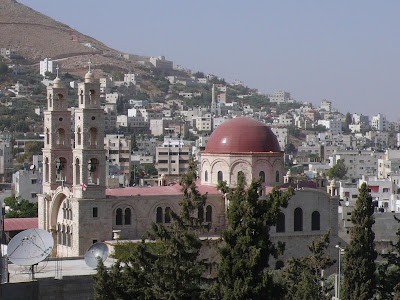
This city is conservative, and I don't care much for tradition. Tradition and religion are not the same, but many people think they are. After a few days in the remote village where my family comes from, packed with too much tradition and over zealous fallaheen, and almost losing our minds, we departed for Nablus where we were put straight to work. I'm volunteering at the university in the public relations department that organizes this fantastic summer camp for international and local youth. I adore the hospitality here, minus the stares that I constantly get and the jaws dropping when I respond in a perfectly constructed Arab sentence to "welcome! welcome!" mistaking me for a foreigner. You don't find people like this [hospitable] where I live [Canada].



This used to be a building, demolished by the IDF during the intifada. There is word they are making a playground...

With an assigned student guide that I refer to as an absolute gem, we visited the Old City of Nablus, a haven of pregnant stray cats, demolished buildings (thank Israel's countless invasions on Nablus during the second intifada) and construction. They are fixing the water pipes, or modernizing the West Bank, whatever you want, which is supposedly "hope" for the Palestinians because rules and regulations represent progress. How about focusing your energies on other things that will drive proper change as opposed to having police officers roam the streets (as if the occupation isn't enough) giving out tickets like North American police officers on New Year's Eve, and creating new laws that resemble the unnecessary implementation of rules in the West? This discussion will continue as I continue touring the various cities.


A tour in Balata refugee camp, the most populated refugee camp in the West Bank, meant a dance with sadness. Overcrowded is an understatement - this is beyond the suburbs, your house is basically in the other, and the things like secrets, privacy, sunlight and proper air circulation do not exist here.



The first floor is what replaced the tents 8 years after the creation of the refugee camp. These would house an entire family. Once the family grew, they would build another room on top of the first room.

Narrow alleys of Balata refugee camp

We climb an old camel brown Opel, owned by a 70-year old man originally from Yazoor, a city near Jaffa. He was eight when the Nakba happened. The window is a workout to bring down, and the heat makes me put in the extra effort to get it down. We arrive in a part of Nablus where the air is cooler, and he recounts his story, and how he was displaced, like 750,000 other Palestinians in 1948. His story is different than other testimonials I've witnessed: not only does he have the key to his house, but he has over 100 deeds to land he owns, some from the British Mandate, others from the Ottomon Empire. The documents also include marriage certificates and old receipts. He owns dunams and dunams of land - and if we calculate the old Palestinian gineh ($4 dollars is approximately 1 gineh), he's wealthy.










Ottoman era

Right of Return - resolution 194











WOW Danah! What an adventure... I am so proud of you and wish more than anything I could be there with you!
ReplyDeletelove,
your biggest fan, Lamb ICE.
Wonderful, educative, thought provoking, stunning pics... you are not only a true example of living one's life as one wants, but also being brave enough to really see, learn and experience the world outside your window. Hat's off to you Danah, I am most proud.
ReplyDelete